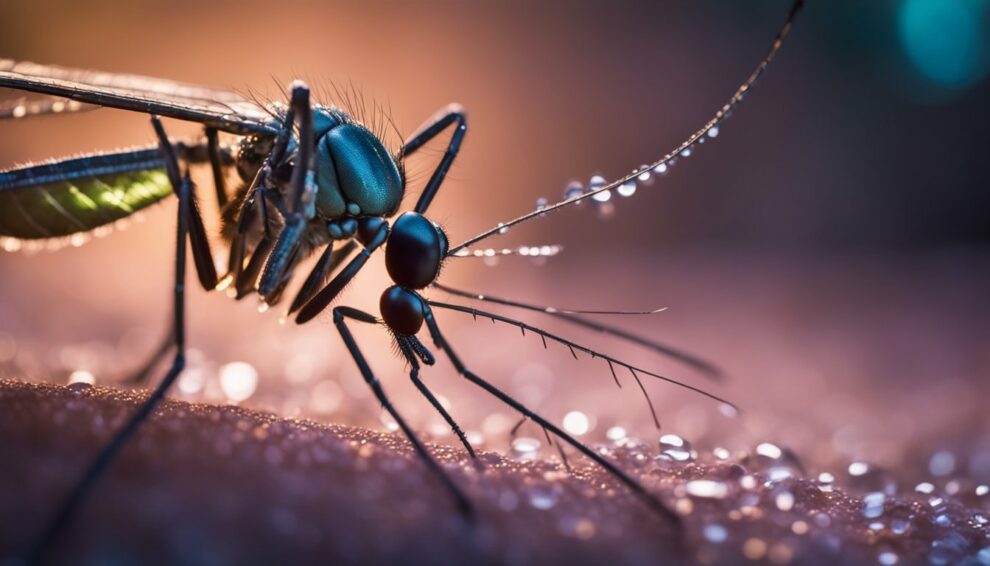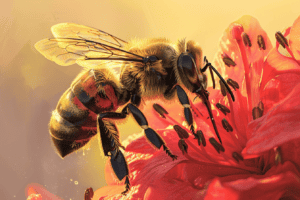Mosquitoes are pesky insects that seem to always find a way to ruin a perfect summer day.
They are known for their itchy bites, which can cause discomfort and even transmit diseases.
But have you ever wondered why mosquitoes bite in the first place?

The answer lies in their thirst for blood.
While both male and female mosquitoes feed on nectar for nourishment, only female mosquitoes require blood to produce eggs.
They use their specialized mouthparts to pierce the skin of their host and extract blood. But why do they prefer human blood over other animals?
It turns out that mosquitoes are attracted to the carbon dioxide that humans exhale, as well as certain chemicals found on our skin.
This makes us an easy target for these bloodthirsty insects. However, not all humans are equally attractive to mosquitoes.
Factors such as blood type, body odor, and even clothing color can make some people more susceptible to mosquito bites than others.
The Mosquito’s Quest for Blood
Mosquitoes are infamous for their bites, which can leave itchy, red bumps on your skin. But why do they bite in the first place?
The answer lies in their biology and the need to reproduce.
Anatomy of a Mosquito Bite
When a mosquito bites, it uses its proboscis, a long, thin mouthpart, to pierce the skin.
The proboscis contains two tubes – one that injects saliva and another that sucks up blood.
The saliva contains an anticoagulant that prevents the blood from clotting, making it easier for the mosquito to feed.
As the mosquito feeds, it can take up to three times its body weight in blood.
This blood serves as a source of protein, which is essential for the development of eggs in female mosquitoes.
Male mosquitoes, on the other hand, do not feed on blood and instead rely on nectar for their energy needs.
Why Female Mosquitoes Bite
Only female mosquitoes bite, and this is because they need the protein in blood to produce eggs.
Female mosquitoes are blood feeders, and they will seek out a host to feed on.
They are attracted to their hosts by the carbon dioxide they exhale, as well as body heat and skin bacteria.
Mosquito bites can be itchy and uncomfortable, but they can also transmit diseases such as malaria, dengue fever, and Zika virus.
When a mosquito feeds, it injects its saliva into the host’s skin.
This saliva contains proteins that can cause an immune response, leading to itching and swelling.
In conclusion, mosquitoes bite to obtain the protein they need for egg development.
While their bites can be annoying and sometimes dangerous, it is important to remember that mosquitoes play a vital role in the ecosystem as pollinators and a food source for other animals.
Attracted to You: How Mosquitoes Find Their Targets

Mosquitoes are infamous for their itchy bites. But how do they find their targets in the first place?
It turns out that mosquitoes use a variety of methods to locate their next meal.
Sensing Carbon Dioxide and Body Heat
One of the primary ways that mosquitoes locate humans is by sensing the carbon dioxide we exhale.
Mosquitoes have a specialized olfactory system that allows them to detect carbon dioxide from up to 50 feet away [1].
Once they get closer to their target, mosquitoes use their ability to detect body heat to pinpoint the exact location of exposed skin.
The Role of Scent and Sweat
Mosquitoes are also attracted to the scent of human skin. Specifically, they are drawn to the chemical compounds that are present in sweat.
These compounds vary from person to person, which is why some people are more attractive to mosquitoes than others [2].
Mosquitoes are also attracted to certain types of bacteria that live on human skin.
Influence of Genetics and Blood Type
Believe it or not, your genetics and blood type can also play a role in whether or not mosquitoes find you attractive.
Studies have shown that people with type O blood are more attractive to mosquitoes than people with type A or B blood [3].
Additionally, certain genetic factors can influence the amount of lactic acid and other compounds that are present in your sweat, which can make you more or less attractive to mosquitoes.
In summary, mosquitoes use a combination of methods to locate their next meal, including sensing carbon dioxide and body heat, detecting scent and sweat, and even being influenced by genetics and blood type.
By understanding how mosquitoes find their targets, we can take steps to protect ourselves and reduce the risk of mosquito-borne illnesses.
Fun Fact: Did you know that only female mosquitoes bite? Male mosquitoes feed exclusively on nectar and other plant juices [4].
[1] https://www.houstonmethodist.org/blog/articles/2022/jun/why-are-mosquitoes-attracted-to-some-people-more-than-others/ [2] https://www.self.com/story/why-are-mosquitoes-attracted-to-me [3] https://www.verywellhealth.com/reason-mosquitoes-bite-some-people-more-others-4858811 [4] https://www.nationalgeographic.com/animals/invertebrates/m/mosquito/Mosquitoes and Disease Transmission

Mosquitoes are not just pesky insects that cause itchy bites; they are also responsible for transmitting a variety of diseases.
Mosquito-borne illnesses are caused by viruses and parasites that are transmitted to humans through mosquito bites.
Common Mosquito-Borne Diseases
Some of the most common mosquito-borne diseases include malaria, zika, dengue, chikungunya, yellow fever, and West Nile virus.
Malaria is caused by a parasite that is transmitted by the Anopheles mosquito and is responsible for hundreds of thousands of deaths each year.
Zika, on the other hand, is a virus that is primarily spread by the Aedes mosquito and can cause birth defects in babies born to infected mothers.
Dengue and chikungunya are also caused by viruses transmitted by the Aedes mosquito and can cause fever, joint pain, and other symptoms.
Yellow fever is a viral disease that is transmitted by the Aedes and Haemagogus mosquitoes and can cause jaundice and liver damage.
Finally, West Nile virus is transmitted by the Culex mosquito and can cause fever, headaches, and other symptoms.
Research on Mosquito-Transmitted Infections
Scientists are constantly researching ways to prevent and treat mosquito-borne illnesses.
One area of research involves studying the genetics of mosquitoes to better understand how they transmit diseases.
For example, researchers have identified genes in mosquitoes that are responsible for their ability to transmit malaria.
By targeting these genes, scientists hope to develop new ways to prevent the spread of the disease.
Another area of research involves developing vaccines and treatments for mosquito-borne illnesses.
For example, there are currently vaccines available for yellow fever and Japanese encephalitis, two diseases that are transmitted by mosquitoes.
Researchers are also working on developing vaccines for other diseases, such as malaria and dengue.
In addition to developing vaccines and treatments, researchers are also working on developing new ways to prevent mosquito bites.
This includes developing new mosquito repellents and insecticides that are safe and effective.
By better understanding how mosquitoes transmit diseases and developing new ways to prevent bites, scientists hope to reduce the spread of mosquito-borne illnesses and improve public health.
Protecting Ourselves from Mosquito Bites

Mosquitoes are notorious for their thirst for blood, but there are ways to protect ourselves from their itchy and irritating bites.
Effective repellents and clothing choices, environmental control, and prevention techniques are some of the most effective methods to keep mosquitoes at bay.
Effective Repellents and Clothing Choices
Repellents are an effective way to keep mosquitoes away.
Insect repellents containing DEET, IR3535, Picaridin, and oil of lemon eucalyptus are some of the most popular and effective repellents available.
These repellents work by masking the scent of carbon dioxide and other chemicals that attract mosquitoes.
It is important to follow the instructions on the label when using repellents.
Wearing protective clothing is another way to avoid mosquito bites. Long-sleeved shirts and pants can protect the skin from bites.
Clothing treated with permethrin, a synthetic insect repellent, or already treated with the chemical, can also be effective in repelling mosquitoes.
Environmental Control and Prevention Techniques
Environmental control and prevention techniques can also be effective in reducing mosquito populations.
Mosquitoes breed in standing water, so it is important to eliminate any standing water around the home.
This can include emptying containers that can hold water, such as flower pots, bird baths, and gutters.
Traps can also be used to reduce mosquito populations.
Mosquito traps work by attracting and trapping mosquitoes using a variety of methods, including light, heat, and carbon dioxide.
Habitat modification is another way to reduce mosquito populations.
Mosquitoes prefer to rest in cool, dark, and damp areas, so it is important to keep the environment around the home dry and well-lit.
This can include trimming bushes and trees, removing debris, and keeping the lawn well-maintained.
By using effective repellents and clothing choices, and implementing environmental control and prevention techniques, it is possible to protect ourselves from the pesky and irritating bites of mosquitoes.
Frequently Asked Questions

What makes mosquitoes choose certain people to bite?
Mosquitoes are attracted to certain chemicals that are naturally present in human sweat, breath, and body odor.
They are also attracted to heat, movement, and dark clothing.
Some people may produce more of these chemicals than others, which makes them more attractive to mosquitoes.
Additionally, mosquitoes are more likely to bite people who have recently consumed alcohol or certain foods like bananas or garlic.
Is there a reason mosquitoes prefer a specific blood type?
Research has shown that mosquitoes do have a preference for certain blood types, with Type O being the most attractive.
This is because Type O blood contains more of the chemicals that mosquitoes are attracted to.
However, mosquitoes will still bite people with other blood types if they are unable to find someone with Type O blood.
How do mosquitoes detect and target warm-blooded creatures?
Mosquitoes have a highly developed sense of smell that allows them to detect the chemicals and carbon dioxide that are emitted by warm-blooded creatures.
They use this sense of smell to locate their targets from a distance of up to 50 meters away.
Once they get closer, they use their eyesight to locate exposed skin and then use their proboscis to pierce the skin and suck blood.
What happens to a mosquito if it consumes too much blood?
Mosquitoes are able to consume up to three times their own weight in blood.
However, if they consume too much blood, they may become too heavy to fly and may be unable to escape from predators.
Additionally, consuming too much blood can cause the mosquito’s digestive system to become overloaded, which can lead to death.
Can mosquitoes transmit diseases through blood, and how does that work?
Yes, mosquitoes can transmit diseases like malaria, dengue fever, and Zika virus through their bites.
When a mosquito bites an infected person, it ingests the virus or parasite that causes the disease.
The virus or parasite then multiplies inside the mosquito’s body and can be transmitted to another person when the mosquito bites them.
How have mosquitoes adapted to feed on blood throughout their evolution?
Mosquitoes have evolved a number of adaptations that allow them to feed on blood more efficiently.
For example, they have a proboscis that is specifically designed to pierce skin and suck blood.
They also have a saliva that contains anticoagulants, which prevent the blood from clotting and allow the mosquito to feed for longer periods of time.
Additionally, female mosquitoes have evolved to rely on blood for egg production, which has driven the evolution of their blood-feeding behavior.









